Rondel M1 car-by-car histories
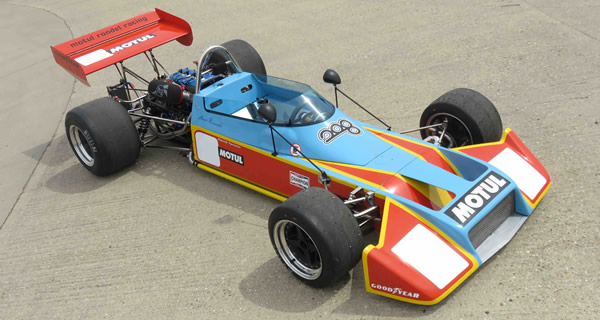
David Tomlin's beautifully restored Motul Rondel F2 in May 2017. Copyright Marcus Pye 2017. Used with permission.
The Rondel M1 was usually known as the Motul M1, in deference to Rondel Racing's main sponsor. It was used in F2 in 1973, winning two races, before Motul pulled out and Rondel closed down.
Ron Dennis and Neil Trundle formed Rondel Racing in 1971, running Brabham BT36s in Formula 2 for drivers Graham Hill and Tim Schenken. Later that season, Bob Wollek joined the team in a third BT36, bringing all-important sponsorship from French oil company Motul. Rondel were Brabham's main customer in 1972, running BT38s for Schenken, Wollek, Carlos Reutemann and Henri Pescarolo, with Jean-Pierre Beltoise, Ronnie Peterson and others guest driving at some events. The team was very professionally run and impeccably presented, and results were good, with Hill winning one race in 1971 and both Pescarolo and Schenken winning races in 1972. The team operated out of an equally immaculate base at Feltham, near Heathrow, and Dennis had brought in City of London ship-broker Tony Vlassopulos to chair the company.
Rondel had an increasingly difficult relationship with Brabham constructors MRD, which was by now fully owned by Bernie Ecclestone since Ron Tauranac's departure, and for 1973, Dennis and Trundle decided to build their own cars, recruiting Brabham's talented aerodynamicist Ray Jessop to design a Formula 2 car for 1973, which would then be followed by a F1 car for 1974. The resulting 'Motul M1', named after the team's title sponsor, was ready by October 1972 and was tested at Goodwood by Schenken, already smartly turned out in the livery of Motul and Radio Luxembourg. The M1 was a very straightforward and orthodox car, with a bathtub monocoque constructed from 16-gauge and 18-gauge NS4 aluminium, with strengthening around the drivers legs, and a tubular engine bay. The main radiator was housed in a wide bluff nose, suspension was outboard all round, and brakes were outboard at the front and inboard at the rear. It was initially tested with an alloy block Ford BDA engine built by Race Engine Services (RES) and mated to a modified Hewland FT200 gearbox. The biggest problem for Rondel at the start of the season was the choice of engine, as March had an exclusive contract for the new BMW M12 engine which would prove dominant. Rondel started out using Alan Smith's Cosworth FVD and Cosworth's iron block BDG engines, but also tried alloy block BDA engines from suppliers RES and Racing Services, as well as Cosworth's iron block BDF engines prepared by Rondel's own engine shop, overseen by Yoshiatsu Itoh. A six-car team was planned for 1973, and at the opening races the drivers were Schenken, Pescarolo, Wollek, Jean-Pierre Jaussaud and Jody Scheckter. After Scheckter headed off to the US for his planned F5000 season, Tom Pryce took over his car with sponorship from Chris Meek's Titan Properties.
Despite not being able to keep up with the March-BMWs in practice, Rondel finished 1-2 at Thruxton in April thanks to Pescarolo and Wollek, after which Schenken had a string of podium finishes culminating in a win at the Norisring in September, where Rondels finished 1-2-3. The team only just completed the season due to financial constraints, as an expected second major sponsor never materialised and the team overspent by £30,000 to £40,000. The oil crisis that started in October 1973 was one factor in Rondel losing Motul's sponorship at the end of the season, but this was not the whole story, as in January 1974, it was announced that Motul would be sponsoring the BRM F1 team in 1974, taking Pescarolo with them. Schenken, who had stayed out of F1 in 1973 in the hope of driving the Rondel F1 car, jumped ship to rejoin Tauranac in the new Trojan F1 team, leaving Pryce to be tipped as the driver of the F1 car, which was then expected to be ready by mid-March. However, the finance could not be found and before the F1 car was even ready, Chris Meek took over the project with sponsors Tony Vlassopulo and Ken Grob giving the project its new name: Token. Trundle and Jessop stayed on board, but Ron Dennis spent a low-key 1974 running a team of F2 Surtees TS15As for a pair of Marlboro-sponsored Ecuadorians.
Further information about the Rondel M1s would be gratefully received. Did you own one? Race one? Please email Allen at allen@oldracingcars.com if you can add anything.
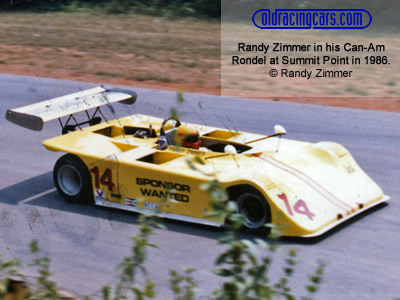
Randy Zimmer in his Can-Am Rondel at Summit Point in 1986. Copyright Randy Zimmer 2001. Used with permission.
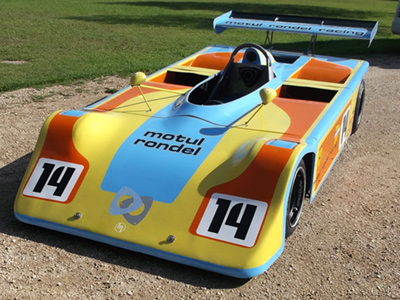
Seann Burgess's restored Can-Am specification Rondel M1 in 2021. Copyright Seann Burgess 2021. Used with permission.
The prototype Rondel was used for testing in late 1972, before the first production cars were built. It was taken to Hockenheim 8 April 1973 as team spare, and to Pau as a spare for Tim Schenken, but not raced. Its history is then unknown until 1974, and it appears it has been acquired by Fred Opert to use as a set of spares. After Mike Rand crashed his car, wrecking the monocoque, 201 was supplied to Ron Ignatowski (Milford, CT), who rebuilt Rand's car on 201's tub with a BRM 1-litre engine and used it in SCCA Formula C. In 1980 it was sold to Randy Zimmer (Buffalo, NY) as the basis for his Can-Am car. He raced it with a Volkswagen engine in 1982 and then with a Mazda rotary engine from 1983 to 1986. Zimmer then entered it for Jim Del Russo in the 1987 CAT championship, and raced it a few more times himself in 1989, 1990 and 1994. Then retained for many years until Zimmer sold it to Seann Burgess (Markdale, Ontario) in 2019. Seann has restored the car as a Can-Am to start with, but will look at how it could be converted to F2 specification later.
Driven by: Henri Pescarolo, Tim Schenken, Mike Rand, Ron Ignatowski, Randy Zimmer and Jim Del Russo. First race: Bryar Motorsport Park, 27 May 1974. Total of 29 recorded races.
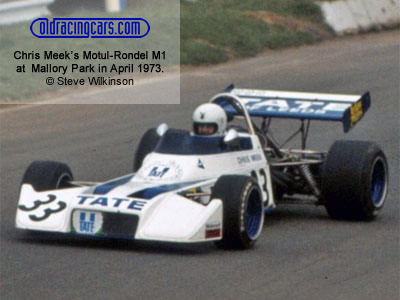
Chris Meek on his debut in the Formula Atlantic Motul Rondel M1 at Mallory Park in April 1973. Copyright Steve Wilkinson 2019. Used with permission.
Sold new to Chris Meek (Leeds, West Yorkshire) to run in British Formula Atlantic and libre racing, sponsored by his property company Titan Properties and with support from his local Ford dealer Tate of Leeds, but the team withdrew after just a few races and the Rondel was advertised in June. This is presumably the car used by Tom Pryce for three Atlantic races in July, and by Viv Candy in an end-of-season libre race at Croft. Sold via Fred Opert to Mike Rand (Greenwich, CT) for Formula B in 1974. When he received it, it was white with Titan Properties on the rear wing, just as Meek and Pryce had raced it. It was damaged in a road accident but repaired, but then crashed into the Armco during qualifying for an SCCA National at Road Atlanta. The monocoque was scrapped, but the rest of the car was rebuilt using the monocoque from 201, and taking that identity.
Driven by: Chris Meek, Tom Pryce and Vivien Candy. First race: Mallory Park (R1), 11 Mar 1973. Total of 7 recorded races.
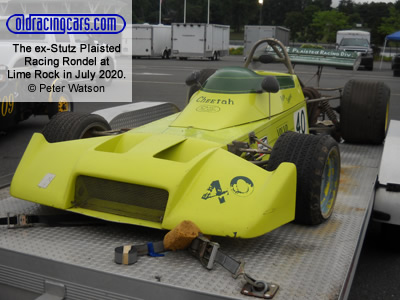
The former Stutz Plaisted Racing Rondel on display at Lime Rock in July 2020. Copyright Peter Watson 2020. Used with permission.
The car raced by Tim Schenken for Motul Rondel in F2 in 1973, and believed to be the same car all season. Then sold via Fred Opert to Stutz Plaisted Racing, and raced for the team by Peter Symonds (Salem, MA). Symonds car in SCCA Formula B during 1974 was entered as a Cheetah, but when he appeared for the SCCA Formula B race that supported the US GP at Watkins Glen in October 1974, his car was given as a Rondel M1. The car was apparently owned by Plaisted's father, John Floyd Plaisted, and it was still in his possession when he died in February 1979. Many of his cars were sold at auction in December 1979, and the Rondel was bought by Bob Connearney (Andover, MA) and retained by him. It still has the Ford twin cam engine it would have used in Formula B in 1974. Robert Connearney passed away in June 2020, and his collection of cars was offered for sale by Clarke Taylor at Historic Motor Sports (Candia, NH). The unrestored and heavily corroded Rondel was on display at a a VSCCA event at Lime Rock in July 2020, still in its Stutz Plaisted Racing livery, and still wearing its original 203 chassis plate. Sold to Steve Worrad and returned to England. In the process of restoration in June 2021.
Driven by: Tim Schenken, Vern Schuppan and Peter Symonds. First race: Hockenheim (R2), 8 Apr 1973. Total of 10 recorded races.
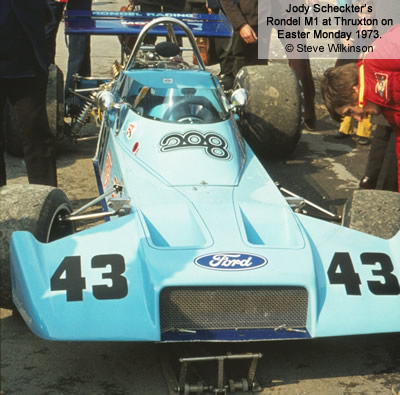
Jody Scheckter's Rondel M1 at Thruxton on Easter Monday 1973. Copyright Steve Wilkinson 2019. Used with permission.
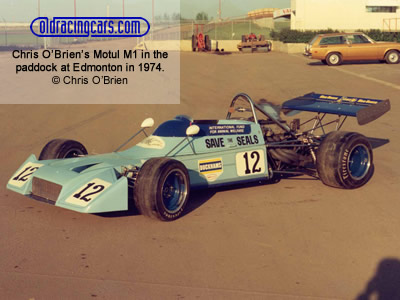
Chris O'Brien's Rondel M1 in the paddock at Edmonton in 1974. Copyright Chris O'Brien 2007. Used with permission.
The car used by Jody Scheckter as part of the Motul Rondel team at the first two F2 races of 1973. In June, Titan Properties, the company owned by Chris Meek and Malcolm Wayne, sponsored this car for Tom Pryce to make his F2 debut for Motul Rondel. He drove it until Rouen in June, where he retired with a blown engine, but then had a new car, chassis 208, when he returned to F2 in August. Chassis 204 was sold at the end of the season via Fred Opert to Chris O'Brien (Ottawa, Ontario /Halifax, Nova Scotia) and raced in the Players Canadian Formula Atlantic series in 1974. O'Brien crashed the car at Mosport in July 1974 and it was rebuilt on a new monocoque in time for Sanair two weeks later. It was advertised in December 1974 as "ex-Scheckter" with spares that included a monocoque, presumably the one damaged at Mosport. O'Brien recalls that he sold the car back to Opert. Unknown in 1975, but to Dean Lundgreen (Milwaukee, WI) for 1976, when he scored eight points in Central Division Formula B, and 1977, when he scored 18 points and qualified for the Runoffs. To Ron Drew (Milwaukee, WI) and fitted with a Cosworth BDJ for Formula C in 1978 and 1979, then to Tim Joyce April 1980, then to Greg Dauterman (Fond du Lac, WI) February 1981 and used in Formula Continental up to June 1985. Dauterman sold it Bill Schley at Schley Motor Cars in Waukesha, Wisconsin, and from him it was sold to Jurg Dubler in Switzerland in January 1990. Then sold to Jody Scheckter in June 1999, and picked up by Kerry Adams who then looked after his cars. It has since been immaculately restored to original condition, and is in the care of Sam Kendle of Kendle Adams Motorsport Limited at Scheckter's Laverstoke Park Farm in Hampshire. Still in the collection in March 2024.
Driven by: Jody Scheckter, Tom Pryce, Chris O'Brien, Dean Lundgreen, Ron Drew, Tim Joyce and Greg Dauterman. First race: Hockenheim (R2), 8 Apr 1973. Total of 34 recorded races.
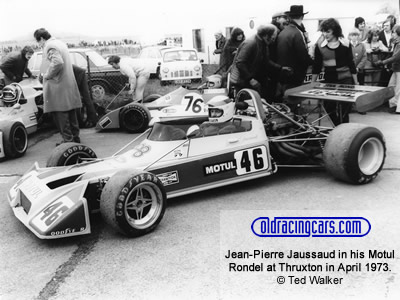
Jean-Pierre Jaussaud in his Motul Rondel at Thruxton in April 1973. Copyright Ted Walker 2019. Used with permission.
The car raced by Jean-Pierre Jaussaud for Motul Rondel in F2 in 1973, and believed to be the same car all season. Also raced by Tim Schenken at Karlskoga in August. Subsequent history unknown, but the car later raced by Iain McLaren was described as "ex-Jaussaud".
See the Iain McLaren car. Chassis 205 was rediscovered in the US in July 2020. More information is to follow.
Driven by: Jean-Pierre Jaussaud and Tim Schenken. First race: Hockenheim (R2), 8 Apr 1973. Total of 8 recorded races.
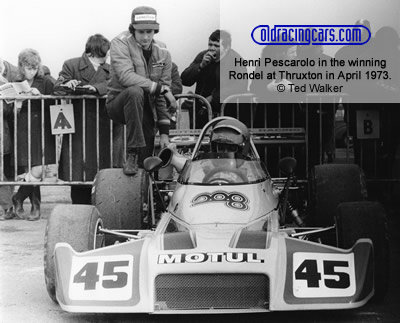
Henri Pescarolo in his race-winning Motul Rondel at Thruxton in April 1973. Copyright Ted Walker 2019. Used with permission.
The car raced by Henri Pescarolo for Motul Rondel in F2 in 1973, and believed to be the same car all season. Also raced by Tim Schenken at Pau, Kinnekulle Ring and Rouen. This car was fitted with a Schnitzer BMW engine for the last two races of the season. Then believed to have been sold via Fred Opert to the US so this may be the car wearing Pescarolo bodywork that was sold to Alistair Justason (Toronto, Ontario) in 1974, then Bob Beyea in 1975. Chassis 206 was later bought from Opert by Randy Zimmer as a source of spares for his Can Am car. Still with Zimmer in 2010, but by July 2011, it had been sold to Richard Parkin and Martin Walker in the UK. From them, it later went to Martin Donn, still unrestored, and then to Steve Worrad (Whitchurch, Shropshire) in January 2019. Still with Worrad in June 2021.
Driven by: Henri Pescarolo and Tim Schenken. First race: Hockenheim (R2), 8 Apr 1973. Total of 9 recorded races.
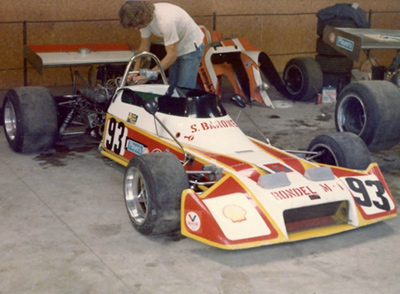
Seb Barone's Rondel M1 at Mosport Park in July 1974. Copyright Peter Viccary (gladiatorroadracing.ca) 2021. Used with permission.
The car raced by Bob Wolleck for Motul Rondel in F2 in 1973, and believed to be the same car all season. Like most of the team's cars, this went to Fred Opert for 1974 to be converted for use in SCCA Formula B and Canadian Formula Atlantic. Assuming Wolleck used the same car all season, this would then be "ex-Wolleck" car that Seb Barone (Portland, CT/Middletown, CT/Dilliner, PA) remembers buying for 1974. After a season in the Canadian Formula Atlantic series, Barone traded it back to Opert for his 1975 Chevron B29. According to Cy Morland, who owned chassis 207 from 1998 to 2008, the car was owned after Barone by John Stowe in New England for an extended period, so would be the Rondel raced by Stowe in New England Region SCCA Regionals in 1976. Morland had the tub completely rebuilt by Marc Bahner, and then sold the car back to England. Subsequent history unknown. Steve Worrad reports that this car is owned by Gaston Rombouts in 2019.
Driven by: Bob Wollek, Seb Barone and John Stowe. First race: Hockenheim (R2), 8 Apr 1973. Total of 18 recorded races.
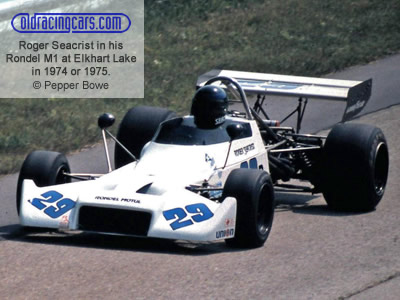
Roger Seacrist in his Rondel M1 between Turn 5 and Turn 6 at Elkhart Lake in 1974 or 1975. Copyright Pepper Bowe 2020. Used with permission.
New for Tom Pryce at Mantorp Park F2 in July 1973, and at three more F2 races that season. Believed to be the car raced by Chris Meek in a formule libre race at Croft in October 1973. Sold via Fred Opert to Roger Seacrist (Chicago, IL) for SCCA Formula B and Canadian Formula Atlantic in 1974. Retained for SCCA Nationals in 1975, when he finished third in a strong field at Blackhawk Farms in August and scored five points in Central Division FB. Then sold to Greg Sun (Clarenden Hill, IL) and raced by him in SCCA Nationals and Regionals from August 1976 to September 1978. Then to Walt Modelski (Woodstock, IL) who raced it in Midwest Council Formula Atlantic and SCCA events from 1979 to 1988. The car then stayed with Modelski until June 2019 when it was sold to Paul Quiniff (Addision, IL), complete with two other monocoques, one of which was brand new. Still with Paul Quiniff in June 2025.
Driven by: Tom Pryce, Chris Meek, Roger Seacrist, Greg Sun and Walt Modelski. First race: Mantorp Park (R11), 29 Jul 1973. Total of 20 recorded races.
The last Rondel M1 monocoque, numbered 209, remained with Rondel when the team became Token in 1974 when Tony Vlassopulos and Ken Gob took over, and was handed over to Peter Thorp of Safir Engineering in 1975. As well as running the Token F1 car, Safir also bult a Safir F3 car for Patrick Neve to race, and in built up the unused Rondel monocoque as a Safir F2 car. It only appeared at the Silverstone F2 race in August 1975, but its Ford Pinto engine was misfiring badly and it was "put away". After Safir went into liquidation, it was acquired by Vlassopulos, and was retained by him until 1988, when it was bought by George Langhorne and former Rondel partner Neil Trundle, complete except for bodywork and gearbox. Langhorne and Trundle restored the car to immaculate condition, completing it in 2016. It was then sold to David Tomlin (Worcester), and race prepared by Pete Johnston's crew at Raceworks Motorsport with a Cosworth BDG engine.
First appearance: Silverstone (R11), 31 Aug 1975.
The Rondel M1s in 1974
Of the eight Rondel M1s known to have been built and raced in 1973, seven were used by Rondel's F2 team and the other by Chris Meek in Formula Atlantic. In October 1973, Rondel were preparing for their 1974 Formula 1 project and all the team Rondel M1s were advertised for sale. Four weeks later, a follow-up advert headed "6 down and 2 to go" listed "Bob Wollek's 1973 team car" and "one new Motul M1 F2 car". The picture on that second advert showed a car wearing #47, which was Wollek's car at Thruxton, but as the same picture had been used for the first advert, this might not be significant. Chris Meek's Formula Atlantic car and six of the seven F2 cars all appear to have been sold to US dealer Fred Opert, leaving just one car in the UK where it was sold to Iain McLaren for Scottish libre races. The ninth M1 chassis remained in England and formed the basis of the Safir F2 car in 1975.
The Rondel M1s were very popular for Canadian Formula Atlantic in 1974, where Chris O'Brien (204), Al Justason (206?), Seb Barone (207) and Roger Seacrist (208) were all regulars in the series. The other three went into SCCA Formula B, where a Ford twin cam engine would have been required. Mike Rand (201) was second in Northeast Division, Peter Symonds in John Plaisted's car (203) was also in NEDiv but with a lower profile, and little was seen of the car of David Ralston until highly-rated youngster Bobby Rahal bought it later in the 1974 season for his first experience of single-seaters and won a SCCA National at IRP first time out.
Motoring News printed chassis numbers for the F2 cars in 1973, but identifying the chassis number of each of the second-hand cars has required a variety of clues, some quite tenuous. Firstly, Randy Zimmer's car has been identified as 201 by its chassis plate which Zimmer still owns, Chris Meek's car is believed to be 202 as that was the only chassis number not mentioned as being part of Rondel's F2 team, Mike Rand's car is then identified as being 202 as its was in the same unique white livery, Seb Barone's car was called "ex-Wollek" and also identified as 207 by a later owner, and Roger Seacrist helpfully referred to his car as 208 in an advert. John Plaisted's car, said to be ex-Schenken, still has its original 203 chassis plate, and Chris O'Brien's car can be identified as chassis 204 from a very precise description of its ex-Scheckter/ex-Pryce history in the Canadian press in early 1974. Two more can be tentatively identified only by references to the cars' previous drivers: Al Justason's as 206 from the Pescarolo bodywork with which it originally arrived in Canada, and Iain McLaren's libre car as chassis 205 from an Ingliston programme refering to it being "ex-Jaussaud". The identification of David Ralston's car is weaker still, as it was just referred to as the first F2 car.
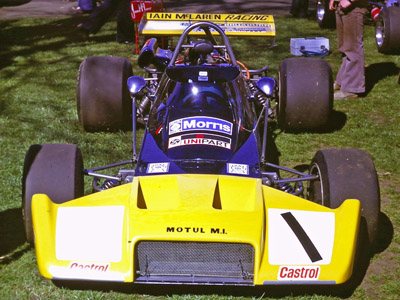
Iain McLaren's Rondel M1 in the paddock at Ingliston in April 1974. Copyright Iain Nicolson 2019. Used with permission.
Iain McLaren drove a "Motul M1" in libre racing in Scotland and the north of England in 1974. A race programme described it as ex-Jean-Pierre Jaussaud, implying it was chassis 205, the only Rondel Jaussaud is known to have raced. The car was not seen in 1975 or 1976, but the "ex-McLaren Motul M1" rolling chassis was advertised from an Edinburgh number in April 1976. For 1977 it was sold to American expat Chris Landrum, who raced in libre in the north of England. It was also raced by Doug Thomson in a sprint at Knockhill in July, and by Ted Dzierzek at Knockhill in August. Landrum then returned home after a season working on the North Sea oil rigs, and shipped the Rondel with him. It was converted to Formula Atlantic specification, and was raced by Landrum in SCAC Nationals, appearing in a race at TWS in July 1978, when Landrum was living in Houma, LA, and one at Riverside in early 1979. Chris Townsend advises that he raced it in Cal Club SCCA Nationals up to 1980.
Driven by: Iain McLaren, Chris Landrum, Doug Thomson and Ted Dzierzek. First race: Croft, 10 Mar 1974. Total of 30 recorded races.
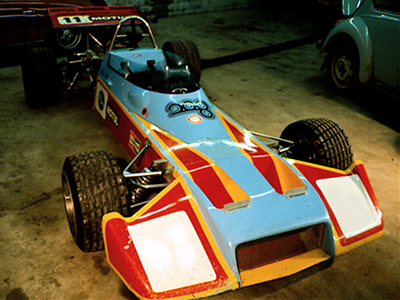
Al Justason's Rondel M1 when first delivered, with Henri Pescarolo's name still on the side. Copyright Al Justason 2007. Used with permission.
Al Justason (Toronto, Ontario, Canada) raced a Rondel M1 in the Canadian Formula Atlantic series in 1974. According to Chris Townsend, when this car arrived, it was still in the Rondel colour scheme with Pescarolo's name on it, implying it was chassis 206, although Justason had no record of the chassis number himself. When Justason "retired" at the end of the 1974 season, he rented the car to Bob Beyea for a couple of Canadian Formula Atlantic races in 1975. He recalls that he later sold the car to Bill Bovenizer in Toronto, and Bill's recollection is that he sold it about 1982 to Jeremy Hill who wanted the engine for his Formula Atlantic March. Subsequent history unknown. Subsequent history unknown.
Driven by: Al Justason, Bob Beyea and Bill Bovenizer. First race: Westwood (R1), 26 May 1974. Total of 13 recorded races.
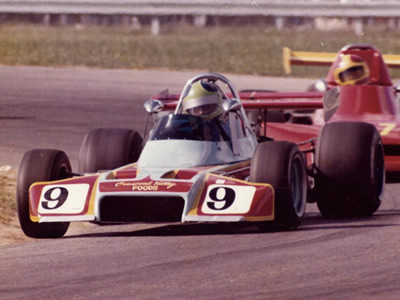
Bobby Rahal winning the SCCA National at IRP in September 1974 in his first race in the ex-David Ralston Rondel M1. Copyright Bobby Rahal 2012. Used with permission.
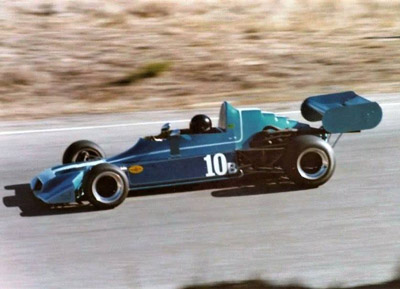
Butch Owsley in the Rondel M1 at Laguna Seca in 1976. Copyright Vincent Puleo 2020. Used with permission.
A Rondel M1 sold via Fred Opert to airline pilot David Ralston (Elmhurst, IL) for SCCA FB in 1974. Sold to up-and-coming local youngster Bobby Rahal (Glen Ellyn, IL) late 1974, and raced in the SCCA National in September, and then the Watkins Glen FB race in October. Subsequently to Tim Fortner and Butch Owsley (San Jose, CA) for 1975 and 1976, and Fortner later told Rahal that he thought it then went to Dwight Zillig (Novato, CA). Zillig advertised the car in March 1978 saying he had only raced it once in two years. Then to Jim Vawter (Pasadena, CA) later in 1978, who had his first race after completing Drivers School at Riverside in August. He is thought to have raced the car until 1980 at least. After Vawter, the car was acquired by Jerry Smith (Novato, CA), and raced once for him at Riverside by Paul Decker, usually a DSR driver. Smith then had the Rondel converted to CSR by mechanic Jim Langan using a widened and stretched LeGrand body. As Smith drove in DSR in 1980, split his time between CSR and DSR in 1981, and then had a Ralt-based CSR car for 1982, the Rondel is likely to have been converted to CSR form in 1981. Smith, who owned an animation company responsible for producing 'Scooby-Doo' and 'The Flintstones', died in 1997. Decker does not know what happened to the Rondel after its CSR career. Subsequent history unknown.
Driven by: Bobby Rahal, Butch Owsley, Dwight Zillig and Jim Vawter. First race: Indianapolis Raceway Park, 22 Sep 1974. Total of 15 recorded races.
The Rondel M1s from 1975 onwards
In the two seasons after 1974, Mike Rand's car went to Ron Ignatowski; Bobby Rahal's car went to Tim Fortner and Butch Owsley; John Plaisted retained 203; Chris O'Brien's 204 went to Dean Lundgreen; Iain McLaren kept his 205(?); Alistair Justason's 206(?) went to Bob Beyea; Seb Barone's 207 went to Peter Stowe; Roger Seacrist kept 208 until March 1976 at least; and 209 remained in England.
Acknowledgements
Thanks to Chris Townsend for his initial hard work on these cars, to David McKinney for his notes, to former owners Bobby Rahal, Randy Zimmer, Al Justason, Chris O'Brien, Mike Rand, Greg Dauterman, Bill Boveniser and Richard Parkin for their help, to current owners Seann Burgess, Steve Worrad, Bob Connearney and Paul Quiniff, to Jim Langan and Paul Decker for their help tracing the ex-Jim Vawter car that became a sports racer, and to Bobby, Al, Chris, Ted Walker, Steve Wilkinson, Iain Nicolson, Vincent Puleo and Peter Watson for kindly allowing me to use their photographs. The initial description of the Motul M1 appeared in Autosport 19 October 1972 p2.
All and any help would be gratefully received. Please email Allen at allen@oldracingcars.com if you can add anything.
These histories were last updated on .